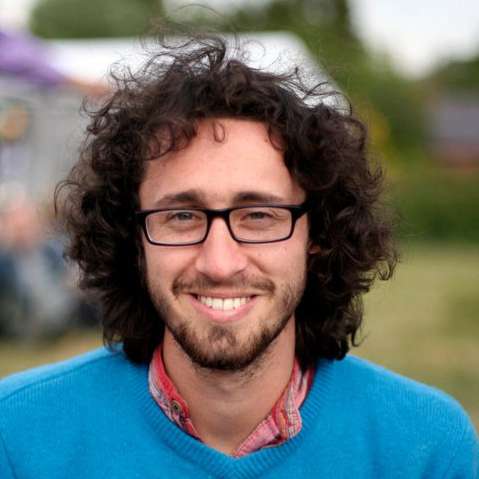St George’s Bristol is an extraordinary venue. Renowned for its unbeatable acoustic amongst performers and listeners alike, there is something unique about it that cannot be attributed to its sonic qualities alone. It’s difficult to put your finger on it: the intimacy? The wonderful abundance of wood? The creaky floor? The comfy chairs? The slightly funky smelling toilets? Whatever it is, its quality is wasted neither on the audience nor those who take to the stage to make that room sing. No finer example of this appreciation can be found than violinist Jack Liebeck’s pledge to St George’s that ‘when the need was greatest’ he would support the hall in any way he could. His support came in the form of a stellar cast of musicians, whose forgoing of their concert fee meant that this could be a fundraising concert befitting St George’s: of the utmost quality and delight.
Although the most intriguing prospect on the programme was the appearance of the legendary Alfred Brendel – not at the piano but reciting his own poetry – Ernö Dohnanyi’s Sextet in C Op.37 was no less deserving of the audience’s attention. Certainly, it was wholly deserving of the performers’ concentration; the first movement’s tempestuousness and unrest would test even the longest-running and highly-established chamber ensemble. The ad hoc nature of the group, and what made the concert so vibrantly exciting, meant that rehearsal time was short; but the quality of the players – Liebeck, Matthew Jones and Guy Johnston (violin, viola and cello) and Katya Apekisheva, Mark Smith and Julian Farrell (piano, horn and clarinet) – shone through. The turbulent music was at times not impeccably tight, but was always passionate and totally absorbing. Masterly control was established in the Intermezzo’s beautiful opening, the piano adding ascending chordal frosting to the bed of string sound; but a menacing tone soon encroached, with a daunting octave melody in the wind accompanied by a martial piano. The third movement features a songlike clarinet, played exquisitely sensitively by Farrell, who excelled all night despite his last-minute recruitment in place of an indisposed Michael Collins. Here a rapid section stretched the ensemble playing to its very limit. The players came through unscathed and attacked a vigorous final movement, with its manic offbeat accents and klezmer-like clarinet and piano melodies, its parody waltzing and heroic horning, with joyous abandon. An expansive passage heralded the ending, but no! – a wonderfully ludicrous summary of all the movements preceding section reminded us of all the fun and games before Apekisheva rounded off the piece with a flourish.
Next the maestro took to the stage, sporting a humorously anachronistic-looking ‘Britney-style’ hands-free microphone. Apekisheva joined Brendel on stage, she at the piano, he seated unobtrusively in its elbow like some octogenarian song-recitalist. Between Brendel’s fantastically bizarre, witty and poignant absurdist poems, read with the panache and confidence of, well, a concert pianist, Apekisheva performed fragmentary movements of György Kurtág’s Játékok (Games). If Brendel was the master of metaphors about smoked pianos, cannibalism, God’s indestructible finger and so on, Apekisheva showed her own brilliant mastery of St George’s famous acoustic in the constant, abrupt and extreme changes of dynamic of Kurtág’s playful fragments. In the movement that ended the half, she achieved a breathtaking minusculity of volume, of which even the poet himself would’ve been proud.
After the interval, Liebeck and friends (minus pianist but plus violinist Victoria Sayles, double-bassist Enno Senft and bassoonist Amy Harmann) returned to the stage for Schubert’s Octet – his warm homage to Beethoven. All memories of the ensemble’s slight malaise in the Dohnanyi was expelled as the musicians radiated ease: the strings sounding as one, Schubert’s favoured clarinet shimmered beautifully, and Mark Smith’s athletic horn crystal clear, albeit occasionally overpowered the texture with its strident dynamic. The second movement is highly reminiscent of that most exquisite example of the pairing of clarinet and strings – Mozart’s – as the serene lyrical clarinet solo soars over the strings. The scherzo’s excited opening string passage was answered by a joyous tutti, and again music brought out the players’ geniality. This was only increased as the snap of one of Liebeck’s strings added an unexpected percussive element towards the movement’s end: fortunately, its absence had little effect on the music. Liebeck politely excused himself and returned to the stage to restring for the work’s final three movements: an adagio theme and variations; a lithe minuet and trio; and a finale of contrasts, the dark start to which soon blossomed into the confident warmth that presides over the majority of the work, and that our generous musicians made resound so beautifully around those hallowed walls.
This was a concert which illuminated that elusive unique quality found at St George’s, something anyone involved with the place can’t help but have for it: a genuine love.


